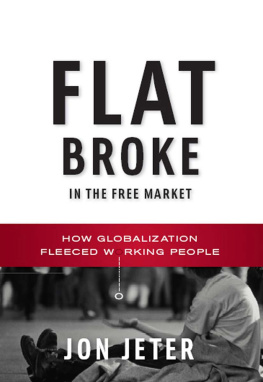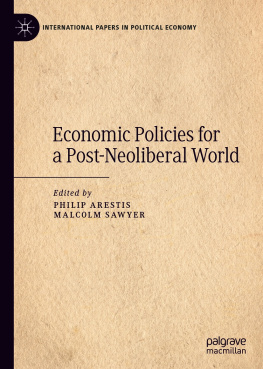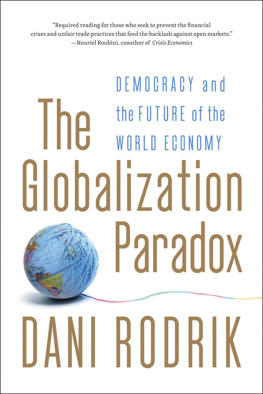For information about permission to reproduce selections from this book, write to Permissions, W. W. Norton & Company, Inc., 500 Fifth Avenue, New York, NY 10110
Jeter, Jon.
Flat broke in the free market: how globalization fleeced working people / Jon Jeter.1st ed.
p. cm.
Includes bibliographical references.
ISBN 978-0-393-07136-8 (hbk.)
1. Free tradeSocial aspects. 2. International tradeSocial aspects. 3. Economic developmentSocial aspects. 4. Economic policySocial aspects. 5. Working classSocial conditions. 6. GlobalizationEconomic aspects. I. Title.
HF1713.J48 2009
306.3dc22
2009005045
W. W. Norton & Company, Inc. 500 Fifth Avenue, New York, N.Y. 10110
www.wwnorton.com
W. W. Norton & Company Ltd. Castle House, 75/76 Wells Street, London W1T 3QT
There is something about poverty that smells like death. Dead dreams dropping off the heart like leaves in a dry season and rotting around the feet, impulses smothered too long in the fetid air of underground caves. The soul lives in a sickly air. People can be slave-ships in shoes.
O VERVIEW
Not just plain terrible. This was fancy terrible; this was terrible with raisins in it.
Dorothy Parker
B y virtually any measure, the last quarter century has been an unqualified economic disaster for ordinary people worldwide.
Unemployment across the globe has climbed to its highest levels since the Great Depression. In rich nations and poor, employees are working longer hours for less money while the companies CEOs are banking bigger and bigger paychecks. Corporate profits account for a larger portion of world income than at any time in the postwar period, while wages have plummeted to their smallest share since the beginning of the Great Depression.
As a percentage of their budgets, nations spend less on public education than they did twenty-five years ago. Families around the world save less than at any time in the past seventy years and spend more than ever on housing, food, gasoline, and medicine. Household debt is at an all-time high.
With more cash spanning the globe faster than ever, 1.3 billion people now live on the equivalent of less than $1 per day. Half the worlds population3 billion peoplesurvive on only twice that, or about 25 cents less than each cow in the European Union receives per day in government subsidies.
Per capita income in Latin America increased by 82 percent between 1960 and 1980 and only 13 percent from 1990 to 2005. The worlds income has increased by nearly US$1 trillion since 1990; sub-Saharan Africas per capita income has fallen by 20 percent in that same time.
From Argentina to Zambia, from Chicago to Soweto and D.C. to Rio, the restructuring of the global economy has ripped a hole through the earth, city by city, block by block, house by house. Globalization has widened inequality, corrupted politicians, estranged neighbors from one another, unraveled families, rerouted rivers, emptied ports of ships, and flooded streets with protesters.
It has created poverty where it did not exist and deepened poverty for women, people of color, and indigenous people. It has swollen prison populations and increased the price we pay for a phone call, a glass of water, a kilowatt of electricity. Globalization has changed the nature of work, the music we listen to, the clothes we wear, the language we speak. It has made the word public a synonym for inferiority and added to our narratives savage ironies and limerick-like contradictions: there is more food than ever, and yet more people go hungry; American dentists have never been richer, but Americans teeth have never been worse; Wall Streets money managers, not Jimmy Hoffa or the mob, gambled away the Teamsters pension funds. Lawmakers can find $700 billion to bail out corrupt bankers but cant come up with $7 billion to treat poor, ailing children.
At the dawn of the twenty-first century, the United States is giving birth to the first generation of Americans whose life expectancy will be shorter, not longer, than their parents. Our system of global finance has put us on the precipice, teetering on ruin. As of mid-2008, the United States has bequeathed to the world the biggest speculative bubble, the worst housing crisis, and the gravest economic meltdown in nearly eighty years, and the response from Americas political class has been the largest single transfer of wealth from the poor to the rich in at least a century.
Worldwide, the ghetto is in its ascendancy.
How did we get here? Mostly, countries simply stopped making things and started buying them. Since 2000, the United States has lost 3 million manufacturing jobs; Brazil has lost 2 million since 1998, South Africa nearly 1 million.
Argentina used to assemble televisions; now it purchases most of them from abroad. Mozambique packaged its cashews fifteen years ago; today the country ships its raw nuts overseas for others to bottle and can. Zambians made their own clothes in the 1980s; now they sort through bundles of clothes shipped from the United States and Europe. The Hunters Point neighborhood in San Francisco used to manufacture the ships that delivered American-made goods to the world; now the ships docked in the Bay Areas ports are mostly from East Asia, unloading foreign-made products for American consumers.
Where there are factories, they have been made the vassals of retail kings like Wal-Mart, who can demand more and more work for less and less money. Gone are the days when a job at the factory provided a springboard to the middle class. The capital of the industrial world is no longer Detroit but Shenzhen, in coastal south China, and the men who migrated to the Motor City half a century ago for union jobs at Ford, GM, and Chrysler have been replaced by women who roam the world to take jobs as maids, nannies, prostitutes, and seamstresses.
In roughly a generation, the economic fundamentalism articulated by the World Bank, International Monetary Fund, and U.S. Treasury has set the world on a path to deindustrialization that has created a transnational underclass. This book takes the measure of that biblical cataclysm.
How do you measure such a thing?
You measure it by broken dreams and despairing hearts and ambitions that never find traction. You measure it by the laid-off Argentine factory worker who, with his family in tow, every evening sifts through his neighbors trash for recyclable materials they can sell for a few pennies per pound.
You mark a catastrophes progression by a frightfully thin Zambian woman who struggles to earn 75 cents a day selling tomatoes at an outdoor market overflowing with thousands of cashiered textile workers, so she can feed her family a single meal of vegetables and porridge; or by the hardworking Brazilian taxi driver in a slum named Judgment who lives hand to mouth and worries constantly that his countrys broken schools, joblessness, and exorbitant interest rates will bequeath to his children the same grinding poverty that he inherited from his father, and his father from his father.
You can gauge a catastrophe by the growing number of prostitutes who roam the streets of Buenos Aires, Oakland, Lusaka, and So Paulo, the escalating crime rates in Montevideo and Cape Town, and the falling marriage rates in Buenos Aires, in Johannesburg, and on Chicagos South Side, where a black woman fears that she will never marry because far too many men from her neighborhood are jobless, incarcerated, or dead.











